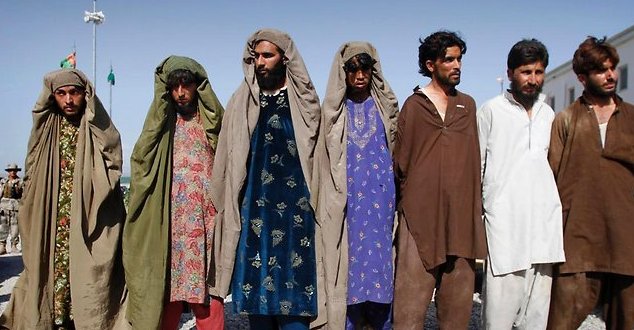A brief primer from Strategy Page on the volatile mix of tribal rivalries that makes Afghanistan such a difficult place to conduct business (or military operations):
The war against the Taliban is increasingly just another chapter in the centuries old conflict between the Pushtun and non-Pushtun tribes of Afghanistan. President Karzai and his allies are from Pushtun tribes that have long been rivals to the tribes that form the core of Taliban leadership and manpower. All this is made worse by the fact that the non-Pushtun Afghans (Tajiks, Hazara and Uzbek), who comprise 60 percent of the population, do not want to lose the increased power (more in proportion to their size of the population) they obtained once democracy was installed in 2002. While Pushtuns are 40 percent of the population, Tajiks are 24 percent, Hazara ten percent, Uzbek 9 percent and various other non-Pushtun minorities the rest. This struggle between Pushtuns and the rest has defined Afghanistan since its creation three centuries ago. The Pushtun are not happy with the recent revisions that gave the majority more power. For Pushtuns, that is just not right. The Taliban are seen as major players in the fight to right this wrong, and for many Pushtuns that makes up for a lot of the evil the Taliban does.
This tribal animosity played a role in the American reaction to Pakistan closing its border to NATO truck traffic last November. The U.S. played hardball with the Pakistanis and shifted truck traffic to the more expensive northern route. This was great for the non-Pushtuns up north, who got a lot more lucrative trucking business. It was a disaster for the mainly Pushtun trucking companies in the south, and the Taliban who extorted “protection money” from the truckers to avoid being attacked. Aware of all that, NATO traffic is not returning to its pre-November levels, and may be reduced still more if the Taliban become more troublesome because their cash flow has increased.
[. . .]
Afghanistan is different to the extent that it has a more violent (than the norm) tribal culture and heavy resistance to anti-corruption efforts. Most Afghans who reach a leadership position consider corruption (demanding bribes and stealing government funds) a right and stealing something of an obligation to make his family/clan/tribe stronger and better able to survive. Many Afghans have noted that countries with less corruption are more prosperous and peaceful, but this anti-corruption faction is still a minority. Corruption continues to be a major problem in Afghanistan and it will get worse when most foreign troops leave in 2014. At that point, the anti-corruption activists will be at more personal risk, as will auditors and other monitors of how foreign aid is spent.
Many (if not most) Pushtuns, and nearly all non-Pushtuns, are hostile to the Taliban and their alien radical Islamic ways. Aside from the lifestyle restrictions, Afghans don’t like the Taliban demand that Afghans put religion before tribal and family obligations and, worst of all, strive for Islamic world conquest. Most Afghans see the Taliban as a bunch of intolerant fanatics who like to execute (often by beheading or bombs) those who oppose them. The Taliban leadership has been aware of these attitudes for years and has tried to restrain its frontline fighters. But this has been difficult, as Pushtun teenagers with guns are prone to bullying less well-armed civilians, especially if they are from another tribe. Ancient cultural habits are hard to break.




